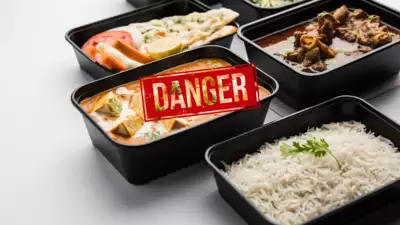A recent viral Instagram video has sparked an online debate about the safety of black plastic food containers commonly used for food delivery and storage. Health experts are warning about potential risks associated with these containers, which contain toxic flame-retardant chemicals that can leach into food, particularly when heated. While there’s no definitive evidence linking black plastic directly to cancer, scientists have found concerning chemicals in 85 percent of black plastic consumer products.
Black plastic, used in everyday items like food trays, containers, and utensils, is often manufactured from recycled materials, including old electronics. These materials contain chemicals like decaBDE to make them flame-resistant, which can transfer into food, especially when exposed to heat or acidic contents.
Can black plastic containers cause cancer?
A study published in the scientific journal Chemosphere analyzed 203 black plastic consumer products and discovered toxic flame-retardant chemicals in 85 percent of the samples. Black plastic utensils and containers pose cancer risks due to toxic flame retardants. DecaBDE and similar compounds are ‘suspected carcinogens and endocrine disruptors’, which can interfere with hormonal systems and potentially lead to cancer. Black plastic contains substances like bisphenol A (BPA) and phthalates, linked to cardiovascular diseases, diabetes, and reproductive issues.
The study talks about the presence of potential mammary carcinogens in materials like styrofoam containers and everyday kitchen utensils, which raises critical questions about the safety of food packaging in general. Since the black color is created by adding a substance called carbon black to the plastic, it contains numerous compounds, some of which like polycyclic aromatic hydrocarbons (PAHs) have carcinogenic properties that have led the International Agency for Research on Cancer (IARC) to classify carbon black as “possibly carcinogenic to humans.”
The health impacts of black plastic
Dr. Ashish Upadhyay, Consultant, Oncology, Fortis Anandapur, Kolkata, mentions a few health impli of using black plastic food delivery containers in everyday life:
1. Cancer: Black plastic containers contain carcinogenic chemicals like PAHs and BPA, which can leach into food and increase cancer risk, particularly breast cancer, with prolonged exposure.
2. Endocrine disruption: Studies have shown that chemicals in black plastic, such as BPA and phthalates, disrupt the endocrine system, leading to potential reproductive health issues, obesity, and diabetes.
3. Developmental and neurological effects: Research indicates that exposure to certain additives in black plastic can result in developmental delays and reduced IQ in children, along with other neurological disorders.
4. Environmental impact: It is difficult to recycle and often ends up in landfills or incinerators, releasing toxic substances like dioxins and furans into the air. These are known carcinogens and can harm human health when inhaled over time.
5. Microplastic contamination: Microplastics from black plastic find their way into food, water, and air, causing inflammation, oxidative stress, and cellular damage in the human body. Their long-term health impacts are still under study but are a growing concern.

While there isn’t definitive evidence directly linking black plastic to cancer, its chemical composition poses enough risks to warrant caution. Microplastics from black plastic, often ingested through items like tea bags and bottled water, contribute to accumulated toxins in the body.
Studies have shown that chemicals in black plastic can disrupt the endocrine system, potentially causing reproductive health issues, obesity, and diabetes. Research also indicates that exposure to certain additives in black plastic may lead to developmental delays and reduced IQ in children, along with other neurological disorders.
Environmental impact of black plastics
The environmental impact of black plastic is significant. It’s difficult to recycle and typically ends up in landfills or incinerators, releasing toxic substances like dioxins and furans into the air, which are known carcinogens when inhaled over extended periods. Microplastics from black plastic can contaminate food, water, and air, causing inflammation, oxidative stress, and cellular damage in the human body. Scientists are still studying their long-term health impacts.
Minimizing exposure to black plastic
Experts unanimously recommend avoiding black plastic for food storage and preparation and advise using materials like glass or stainless-steel reducing exposure to toxic substances.
Moreover, heating food in black plastic, whether in a microwave or otherwise, should be avoided as heating can cause toxic chemicals to leach into food, posing health risks. Even at very low levels, these toxic chemicals can cause serious reproductive and developmental problems, poisoning the brain and kidneys, disrupting human thyroid function, affecting development, and causing long-term neurological damage.
In conclusion, black plastic poses a significant threat to human health, and it is essential to minimize exposure to this toxic material. By avoiding the use of black plastic for food storage, replacing black kitchen utensils, and choosing safer alternatives, to reduce the risk of exposure to the toxic chemicals in black plastic.
Health experts recommend avoiding black plastic for food storage and preparation. They suggest using safer alternatives like glass or stainless steel containers, and replacing black kitchen utensils with wooden or stainless-steel options to reduce exposure to toxic substances.





